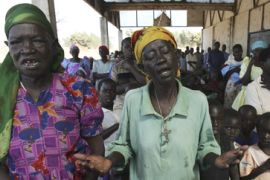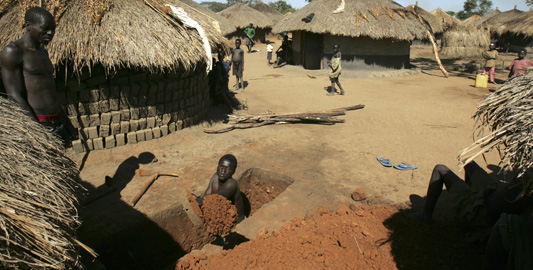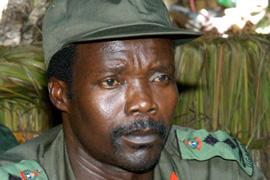Uganda peace talks reach an impasse
The Hague is pressed to drop charges against rebel leader during negotiations.

 |
|
A man digs a grave in a refugee camp for displaced Ugandans. More than 2 million |
Despite recent progress, political observers believe peace talks between the rebels of the Lord’s Resistance Army (LRA) and the Ugandan government are in peril.
Less than a week before the final peace agreement is to be signed, the parties remain deadlocked about the fate of Joseph Kony, a reclusive rebel leader.
His group said it will only sign the peace agreement on April 3 if the International Criminal Court (ICC) drops charges against him.
The move could give the peace process a major boost, but it could also erode the credibility of the ICC, which was created to try people accused of war crimes and crimes against humanity. Kony and his top commanders have been indicted because there is overwhelming evidence against them.
Peace or justice?
Now – in the interest of peace for the people of northern Uganda who have been murdered, raped, abducted and displaced by the rebels – there are calls for the ICC to drop the charges and let the Ugandan government try the rebels.
Documents that have been signed in the southern Sudanese capital of Juba, the venue for peace talks, contain mentions of a special court to try the rebels who have committed atrocities. Those accused of lesser crimes will be tried under mato oput, or traditional justice, preferred by people in Kony’s home region.
Uganda’s courts are semi-independent and many doubt whether they could provide justice of a standard that will satisfy the ICC, which must navigate through a difficult situation.
If it drops the charges, the court will face criticism from the international community and have a hard time justifying its existence. But if it presses ahead with the charges, the peace process may amount to nothing, some analysts say.
No turning back
Yoweri Museveni, Uganda’s president, told reporters on a recent visit to the UK that since his government requested the ICC’s involvement with Kony, he can ask the court to refer the matter back to Uganda.
 |
| LRA forces have abducted and enslaved up to 20,000 Ugandan children [GALLO/GETTY] |
But the ICC is insisting that the charges will not be dropped, despite reports from Ugandan media that the court is looking into the government’s ability to try Kony by international standards.
“Once an arrest warrant is issued, it cannot be withdrawn,” Sonia Robla, an ICC spokeswoman, told Al Jazeera. “The matter is in the hands of judges and charges cannot be dropped. This is the position of the court.”
If indeed this is the official position, and if the rebels stick to their demands, the peace process is doomed, say some leaders.
But negotiators like Ruhakana Rugunda, a cabinet minister who heads the government delegation at the talks, are optimistic.
“Kony has no alternative but to sign the peace agreement,” he told Al Jazeera.
He said media reports that Kony had left his hideout in the Democratic Republic of Congo (DRC) for neighbouring Central African Republic (CAR) were not a setback to the peace process as “Kony has always been mobile”.
Uganda’s options
The government can only hope for the best as there is precious little it can do to salvage the peace process. Prevailing on the ICC to let it try Kony may be good for peace, but there is hardly any time left for this option.
Significantly, human rights groups such as Amnesty International and Human Rights Watch are urging Uganda, a party to the ICC, to honour its obligations.
If the peace agreement fails, the government could choose to continue fighting the LRA. The rebels are in a hopelessly weak position, having suffered heavy defeats over the years.
They have also been classified as a terror group in the wake of the September 11, 2001, attacks. Few governments, if any, are ready to back them, fearing the military might of the US. This puts the government at an advantage.
But many people in northern Uganda, who have lived in terror for 21 years, fear that the LRA, decimated as it is, can still cause suffering.
At the rebellion’s height, insurgents chopped off people’s noses and ears. They abducted children by the hundreds, forcing them to become child soldiers or spouses of the rebels. The LRA’s political agenda has been to rule Uganda according to the “Biblical Ten Commandments”.
The government estimates that thousands have been killed and relief agencies put the number of displaced people at two million.
Skepticism prevails
The current lull in fighting, a result of the continuing talks, has prompted some refugees to return home. But many are still skeptical and continue to live in the camps for the internally displaced, awaiting the signing of the final peace agreement.
 |
| The ICC has charged LRA rebel leader Joseph Kony with war crimes [AP] |
Their doubt is shared by people such as Frank Nyakairu, a reporter on the Daily Monitor newspaper in Kampala. “I think Kony has no intention to end the war,” he told Al Jazeera.
While Kony may not be able to fight the government, the LRA could still be used by other rebel movements as a mercenary army to wreak havoc in the region, added Nyakairu, who has covered the rebellion for the past six years.
Kony has been linked to Chad’s main rebel leader, Mahamat Nouri, and is said to have moved most of his rebels to the Central African Republic (CAR). The LRA rebels have not threatened to resume fighting if peace talks fail, but analysts say it is hard to imagine that they will just sit around with their weapons.
Regardless of what happens with the peace talks, the LRA has the most to lose. If the group signs the peace agreement, its members will be wanted by the ICC, unless charges are dropped. If it doesn’t, then the government will hunt it down.
As Moses Odokonyero, a resident of Gulu, one of the districts that bore the brunt of the rebellion, said: “Success for the LRA in Juba will also be a loss.”